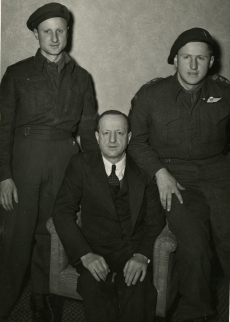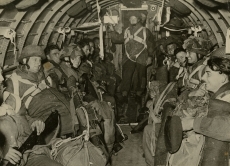Highlights of the Heaps Family Accessions
The stories of the only Jewish brothers to receive the Royal Military Cross during the Second World War are found at the Ontario Jewish Archives, Blankenstein Family Heritage Centre (OJA). Born in Winnipeg in 1916 and 1923 respectively, David and Leo Heaps were the sons of the politician A. A. and Bessie Heaps (nee Morris). Prior to enlisting in the Canadian army in 1942, David Heaps worked as a journalist. In 1943, he was promoted to Sergeant and served in the 2nd Canadian Infantry Division in the Allied Expeditionary Force. He was the only soldier in his regiment to serve for the entire European campaign, and fought at Caen, Channel Ports, Brussels, Antwerp, Falaise Gap, the Schelde and the final campaigns in Holland and Northern Germany.
Leo Heaps received his education at Queen's University, the University of California, and McGill University. At the age of 21, during the Second World War, he was seconded to the British Army and found himself commanding the 1st Parachute Battalion's Transport. He participated in the Battle of Arnhem (1944) as a paratrooper. He was captured by the Germans and upon his escape, he went on to participate in the Dutch underground resistance movement, whose members helped him cross over enemy lines and rejoin the war. Leo Heaps was awarded the Royal Military Cross for his work with the Dutch Resistance. David also achieved the same distinction, thereby making them the only Jewish brothers during the Second World War to win the decoration.
After the war, Heaps went to Israel and aided their army in the establishment of mobile striking units. Whilst there, he met his wife-to-be, Tamar. Together they had one son, Adrian, and three daughters, Karen, Gillian, and Wendy. During the Hungarian Revolution, Heaps led a special rescue team to bring refugees out and across the border. In the mid-1960s he returned to Britain where he dabbled in various entrepreneurial projects as well as writing several books, notably The Grey Goose of Arnhem, telling his own story of Arnhem, the aftermath of the battle, and also the stories of other Arnhem evaders and their dealings with the Resistance. Leo Heaps spent most of his life in Toronto, Canada, and was amongst the forty Canadian veterans who returned to Arnhem in 1994 to mark the 50th anniversary. He died in 1995
David and Leo’s father Abraham Albert Heaps (1885-1954) known as A. A. Heaps, was the founder of the Co-operative Commonwealth Federation, the forerunner of the New Democratic Party. He was arrested for his involvement in the 1919 Winnipeg General Strike, but later acquitted of all charges. He began his political career as an alderman and member of the Trade Union Council and later was elected to the federal House of Commons representing Winnipeg North. He fought against antisemitism and quotas and advocated for the acceptance of Jewish refugees in Canada. He was defeated in 1940 and retired from public life and lived the rest of his days in Montreal.
Over the years, Leo Heaps’ son Adrian has donated records to the Ontario Jewish Archives, Blankenstein Family Heritage Centre related to both his father’s and uncle’s military service and more peripherally, to his grandfather’s political life. This includes extraordinary photographs, military currency, business cards, manuscripts, postcards, as well as war-time correspondence between the brothers and with their father A.A. Heaps. In the most recent accession, there is also a 1948 letter from Leo to Israel’s first Prime Minister, David Ben-Gurion, discussing some issues he was experiencing with the Israeli army. Preserved for future generations and the thousands of people that do research at the OJA, these records document the extraordinary contributions made by the Heaps family. Through them, we gain an intimate view into various world events of the past century.

